Dibyajyoti Sarma's Blog, page 6
May 19, 2022
Our summer presentation/ NOW A POEM NOW A FOREST by Pares...
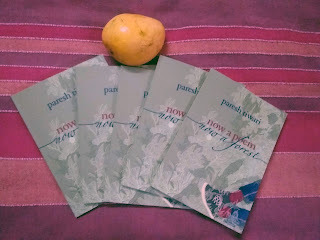
Our summer presentation/
NOW A POEM NOW A FOREST by Paresh Tiwari.
/
Hoshang Merchantwrites: “In one of his poems, Paresh Tiwari says, ‘A poem could be a confessional. The blank sheet of paper a two-by-two box hewn from a dead tree. This poem, however, is an asylum. The words stacked up like bricks. Holding up a roof in the middle of a vast emptiness.’ In this magnificent collection, Now a Poem, Now a Forest, Paresh Tiwari shows us what a poem can be. His journey to get here has been long and adventurous. He has immersed himself in the spirit of free verse, and that of the prose poem. But it is the gentle soul of haibun that has his heart. ”
/
Get the book here: https://papyrusthebookstores.com/papyrus3/categories/red-river-poetry
/
Our summer presentation/ Arjavamby Geetha Ravichandran. /...
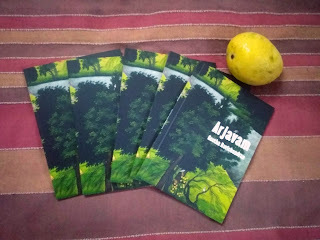 Our summer presentation/
Our summer presentation/ Arjavamby Geetha Ravichandran.
/
Sukrita Paul Kumar writes: “Poem after poem, the fragile wings of the golden butterfly flutter around the reader captivatingly throughout Arjavam, starting from the mystifying dedication itself. If there looms the intense awareness of death, there is also an acute awakening to the stories of the reborn and nirvana. In harmony with the soulful words, the illustrations in the book sit well with the quiet temper of the poems. To achieve the grandeur of Raagam, there had to be to be a coming together of the right rhythm, precise notes and a suitable beat.”
/
Get the book here: https://papyrusthebookstores.com/papyrus3/categories/red-river-poetry
/
May 6, 2022
Six Poems by Dibyajyoti Sarma 1/ We pick flowers The...
Six Poems by Dibyajyoti Sarma
1/ We pick flowers
The flowers that bloom on our hills are red,
like the setting sun,
like my grandfather’s patterned loincloth,
like my mother’s mournful eyes now empty of tears,
like my brother’s bullet-ridden shirt,
like blood, our blood, which we spill indiscriminately.
The flowers that bloom on our hills are yellow,
like the calluses of my father’s hardy heels,
like my grandmother’s gums empty of memories,
like ripe rice grains,
like a piece of dried pork,
like the brass medallions of our ancestors.
The flowers that bloom on our hills are blue,
like the hill shrouded in mist,
like the shawl my sister wraps herself with,
like the city lights we spy upon on moonless nights,
like the vehicles on which they come to tell us to behave,
like the sky, our sky, without shade, without change.
2/ We reject our gods
Keep your gods to yourself, I have my own,
not locked away in a shiny altar, but free,
like breathing or like the idea of democracy
My god is a nonbeliever, who has
forsaken the pleasures of heaven for this
polluted earth, this rancid existence
He resides within me, and he is not jealous
but joyous, not demanding, but curious,
about our wishes he cannot grant
An adventurer, my god is sick of the smoke
of the havans and the sweetness of the prasads,
and the luminance of the inodorous flowers
He is tired of giving, and now he wants to
receive what we have, this inexplicable capacity
for love, and these strange bursts of kindness
My god wants what I want, a handshake instead
of kowtowing, love instead of respect, flesh
instead of faith, blood instead of prayers
My god is a drunk god, who not only
listens but also speaks, not in dead verses
but in slangs picked up on the streets
Keep your gods to yourself, I have my own,
not locked away in a shiny altar, but free,
like breathing or like the idea of democracy
3/ River
The weather is such that
the river is bereft of water.
On the other side of the city,
inside an ice-cool room, a four-year-old boy,
on a blank sheet of paper with multicoloured crayons
draws a miniature river.
The river is filled with water, and
the boy courageously rubs blue crayon
on the white piece of paper;
the river overflows.
If he knew how to draw, the boy,
he’d have drawn a handful of fish,
a small boat, and on that boat,
a fisherman figure.
If he could draw, today, in the picture
of the four-year-old, the fisherman figure
would’ve collected his share of harvest
for a full meal after years of going hungry.
The weather is as such that
the river is bereft of water.
4/ Love
I die the day I love someone
and I do not have
anything to offer.
Empty is my pocket’s desire —
to keep a photograph too
I do not have a wallet.
Love is when
you’ve offered the world to your beloved
and you want to give some more.
5/ Things You Can Do with Your Lover’s Wedding Card
You can roll it and tell him to shove...
You can fold the card and make an origami boat
or a plane and tell him to go fly it.
You can scratch out the other name and
write yours instead and see how it rhymed better.
You can hold it close and cry a river and
smudge the print to find a blank orange paper
where you can write whatever you want —
about that perfect life you had with him
(the impressions of it, anyway).
You can burn the card and scatter the ashes
from your kitchen window, or keep them safe
in the copper urn he got you for your birthday.
You can keep the card between the pages
of your diary as bookmark.
You can, if you are an emotional fool,
write a suicide note on the back of the card
and implicate him for your death
(You can have the last laugh,
though you won’t be there to see it).
You can actually rejoice, say, ‘good riddance,’
and plan your next move.
You can plan to attend the wedding —
the food would be good, and you know
though you are hurt, you can
suffer only this much and you can
always stop thinking about him.
6/ Game
let’s play a game
you and i
let’s play a game
you stand facing me
and i’ll confront you
you draw a circle around me
and i’ll draw a circle around you
you draw another, narrower
i’ll draw another, narrower still
you draw another
i’ll draw another
you draw a circle
and slice my toe to fit me within it
and i’ll slice your toe
you hack my feet to fit me within it
and i’ll hack your feet
let’s play a game, you and i
you dig a hole and i’ll dig a hole
you bury me alive
and i’ll bury you alive
let’s play a game
you and i
you kill me and i’ll kill you
in the name of the lines
which are not drawn yet
in the name of the prophet
who isn’t born yet
let’s play a game
Poet, writer, editor and translator, Dibyajyoti Sarma runs the poetry publishing outfit Red River. Established in 2017, and based in Delhi, Red River has so far published 70 titles, including some of the well-known names in Indian poetry. His third collection of poems, Book of Prayers for the Nonbeliever, was published in 2018.
I have been looking to write about this book for more tha...
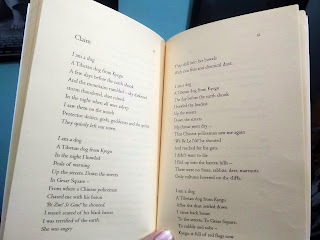
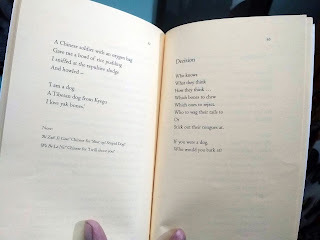
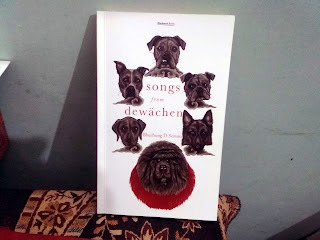
I have been looking to write about this book for more than three months now. But, since today is the birthday of the poet, Bhuchung D Sonam, let’s talk about his latest collection of poems, Songs from Dewachen.
Published by Blackneck Books, an imprint of TibetWrites, Songs from Dewachen contains 42 poems about the dog, the man’s best friend, in every scenario possible. If you are dog-lover, or dog-parent, perhaps this book is not for you, because not all the dogs Bhuchung talks about find happy homes. There are strays, there are dead dogs, their end described in their gory visceral realness, there are dogs killed for “health reasons,” and “The four women walk away/ Carrying heavy bags/ Talking about/ A dog/ Who got clubbed on his mouth/ Before / He was slaughtered.”
Despite the violence, and there is violence (because that’s what we do to dogs, whether on the street and in captivity — “This is when the owner/ Kicks her rear and leashes/ Her back into the apartment/ She slumps/ Remembering her/ Mother in the mountains”), the book is also filled with love and compassion, and the poet’s keen sense of observation of dogs and their behaviour. The poet obviously loves dogs — “Last night grandpa came into my dream/ Walking up a narrow mountain trail./Chakchung followed him a few steps behind/ On a low boulder at the waist of the hill/ They rested.” Such is the poet’s identification with his subject that many poems in the book are narrated from the point of view of the dogs themselves. And in others, the poet wishes to be a dog, “But I am only a human/ I have stairs to climb/ Walls to build, bugs to fix,/ And a whole lot of clowns to please.”
Once you have read the book, and have met the different dogs that populate this beautiful book — a mastiff, a chihuahua, a Doberman, and many others — you may be tempted to read the poems as allegory to our human condition. This becomes evident in the poem called “Claim”, where the poet says, “I am a dog/ A Tibetan dog from Kyegu…”
But I would advise against easy allegorical reading. Read the poems for what they are — our relationship with dogs and how we treat them, with both love and hate, and how the animal kingdom brings out the best and the worst in us, the humans.
I am not really a dog person (I was unlucky to watch the film version of Stephen King’s Cujo when I was an impressionable kid), but I loved, loved this book. One of the best poetry collections I have read.
Thank you for writing the poems, Bhuchung, and thank you for sharing them with us.
And yes, wishing you a very happy birthday.
You can get the book from Champaca Bookstore. https://champaca.in/products/songs-fr...
PS. Dewachen is a Tibetan word meaning “blissful.” The word is associated with “Sukhavati”, a pure land in Mahayana Buddhism, associated with the Buddha Amitābha. It is commonly called the Western Pure Land or the Western Paradise, and is the most well-known of Buddhist pure lands, due to the popularity of Pure Land Buddhism in East Asia.
May 3, 2022
When I was asked to recommend five books for The Bangalor...
When I was asked to recommend five books for The Bangalore Review, I, of course, said yes. I can recommend five books at the drop of a hat, on any given day — I can recommend a set of five books every day. It was easy, I thought. Then it dawned on me — like everything else, sharing your preference too is a political act. So, I needed to pick up a theme, a focus.
First, though I read a lot of books originally published abroad (mostly fantasy fiction and graphic novels), I will have to recommend books published in India. If we don’t talk about our books, who will?
And since I run a small, independent publishing venture, I decided that instead of specific book titles, I should focus on five independent publishers, highlighting one of their best titles.
My first stumbling block was this very label — independent. Simply, an independent publisher is defined as one that operates on its own, rather than as part of any large corporation or conglomerate. But there is a difference in degree. Speaking Tiger is an independent publisher. So is Red River. But can we discuss them together? I think not. So, I decided that there are major independent publishers and there are minor independent publishers. (I am aware the nomenclature is not adequate).
My goal changed again. Now, I wanted to highlight the “smaller” independent publishers. So, entities, such as Speaking Tiger, Roli Books, Om Books, Seagull Books did not make it to my primary list.
Still, I had a long list of names to choose from and oh, what a joy it was revisiting their catalogues.
Then I heard about the closure of Westland Books, and I had to mention Funeral Nights published by Context. This is a modern epic and a rare publishing feat — imagine a mainstream press publishing a thousand-page long novel set in the Khasi hills by a writer from Shillong! I wanted everyone to get a copy before the book disappeared from the market.
I had just four slots and so many names.
Now that the piece is out, I feel accountable to mention the other independent publishers that I would happily recommend on any other day, on any other list.
Here goes, without any particular order:
1. Blaft Publications: Blaft’s electric list includes translations of Tamil Pulp fiction, Indian and Pakistani crime novels, experimental writing, pulp art, science fiction, speculative fiction, graphic novels, and so on. I would recommend Ghosts, Monsters and Demons of India, by J Furcifer Bhairav and Rakesh Khanna — an encyclopedia of evil entities and folkloric fiends from across the country, from Ladakh to Kerala, Lakshadweep to Nagaland, Naraka to Tuchenkwaka.
2. Panther's Paw Publications: Established by Yogesh Maitreya in Nagpur, Panther's Paw publishes Dalit writing with a cause. If nothing else, you should be invested in Panther's Paw just for Maitreya’s passion and grit, his die-hard attitude, and his dedication for his community. I would recommend Savitribai Phule and I by Sangeeta Mulay, a semi-historical fictional book aimed at young adults. Full disclosure: I designed the book.
3. Tara Books: Started in 1994 by Gita Wolf, Tara Books is such an oddity — it combines its love for indigenous art forms with socio-cultural issues with such abandon that each Tara Books title is a joy to behold — each title is special. I would recommend its latest release — A Stitch Out of Time by Anaïs Beaulieu. The book features images of French artist Anaïs Beaulieu’s embroidery on throwaway plastic bags, typically used for disposing waste. The book plays with two powerful themes: environmental degradation symbolised by the ubiquitous take-over of our surroundings by plastic and the slow time of creation, whether of a tree, or a piece of embroidery.
4. Leftword Books: The New Delhi-based publishing house seeks to reflect the views of the left in India and South Asia. It publishes critical and analytical works on a range of subjects, and pays special attention to works on Marxist theory. My recommendation is Halla Bol: The Death and Life of Safdar Hashmi by Sudhanva Deshpande.
5. Tulika Books: Apparently, there are two publishers with the same name. One, based in Chennai, publishes children’s books (we need a separate list for independent publishers of children’s books), and the other, based in Delhi, publishes scholarly and academic books in the arts, humanities and social sciences from a broadly left perspective. My recommendation is Sair-ul-Manazil by Sangin Beg, which, according to the Publishing Next Industry Awards, offers “a glimpse into the multicultural roots of the city that is Delhi.”
6. Bee Books: Based in Kolkata, Bee Books has released some fascinating titles in the last couple of years. My recommendation is The Anger of Saintly Men by Anubha Yadav. You may have already read it. It got some very good press last year.
7. Hawakal Publishers: I am so excited to follow the growth trajectory of this fascinating publishing venture, run by Kiriti Sengupta and Bitan Chakraborty. Started in Kolkata, it now operates from Delhi and publishes a range of titles in English and Bengali. You must check out its poetry catalogue, including the series, Yearbook of Indian Poetry in English. The second edition is on its way. I would recommend Kakka: A Dalit Novel by Vemula Yellaiah, translated from Telugu by K Purushotham and Gita Ramaswamy.
8. Dhauli Books: Established by Manu Dash and based in Bubaneshwar, Dhauli has a varied and eclectic list, including poetry, fiction, translations. But what I admire the most is its commitment to publishing plays, a genre most publishers wouldn’t touch. My recommendation is Cast Out and Other Stories by Sucharita Dutta-Asane. The book is special, and extraordinary.
9. Poetrywala: Run by Hemant and Smruti Divate, Poetrywala established today’s poetry publishing landscape from ground up, and we are grateful that it did. Without Poetrywala, there will be no Red River. In recent years, it has published a series of Selected/Collected Poems of major authors. Each title is worth your time and money. But I would recommend Collected Poems by Gieve Patel. Reading Gieve Patel is a rare joy.
10. Copper Coin: Established by Sarabjeet Garcha in 2013, Copper Coin is an independent, multilingual publishing company committed to celebrating the finest voices in Indian as well as world poetry, nonfiction, and fiction. It is very selective about what they publish, so that you don’t have to — you can trust that every Copper Coin book is worth a read. My recommendation is Pointillism by Sophia Naz.
11. Readomania: Established by Dipankar Mukherjee, Readomania has an exhaustive list of first-rate commercial fiction, and what I find the most inspiring is Mukherjee’s tireless efforts to push its authors to find as many readers as possible. My recommendation is Princesses, Monsters and Magical Creatures, a translation of Thakurmar Jhuli, a collection of Bengali folk tales by Dakshinaranjan Mitra Majumdar.
12. Almost Island: My recommendation is Madagh, Rahul Soni’s translation of the Shrikant Verma classic, one of the finest poetry translations I have ever read.
13: Niyogi Books: There is so much to recommend here — from translations to original fiction to coffee table books, but let me just mention Elegy for the East: A Story of Blood and Broken Dreams by Dhrubajyoti Borah, the first part of a trilogy, written in Assamese by Borah himself, one of the finest novels ever written in Assamese.
14. RLFPA Edition: Established by Linda Ashok, RLFPA Edition has published some fine volumes of poetry. I would recommend Betelnut City by Shalim M Hussain.
15: Vitasta: Founded in 2004, Vitasta identifies pressing issues — human, social and national and understands their significance in the perspective of the overall well-being of mankind by giving voice to authors and supporting their passion and vision. I’d recommend Amit R Baishya’s translation of the landmark Assamese novel, Jangam.
There are more.
16. Yavanika Press
17. Fingerprint Publishing
18. Half Crow
19. Jaico Publishing House
20. Vishwakarma Publisher
Thank you for reading. Thank you, Maitreyee Bhattacharjee Chowdhury and Sucharita Dutta-Asane for asking me to do the list for The Bangalore Review.
https://bangalorereview.com/2022/04/tbr-recommends-april-2022/
May 1, 2022
The book this week recommended by Dibyajyoti Sarma is Pr...
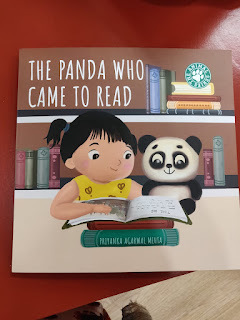 The book this week recommended by Dibyajyoti Sarma is Priyanka Agarwal Mehta’s The Panda Who Came to Read
The book this week recommended by Dibyajyoti Sarma is Priyanka Agarwal Mehta’s The Panda Who Came to Read Printed in Ahmedabad, Mehta has published the book under the imprint Sam and Mi. There are 20 titles focused on themes of empathy, problem-solving and communication
Two of our authors, Sukrita Paul Kumar and Chandana Dutta...
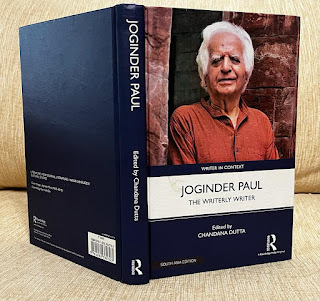
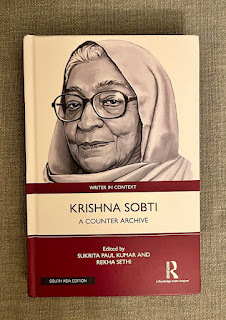 Two of our authors, Sukrita Paul Kumar and Chandana Dutta, have two major academic publications out — Krishna Sobti: A Counter Archive and Joginder Paul: The Writerly Writer respectively.
Two of our authors, Sukrita Paul Kumar and Chandana Dutta, have two major academic publications out — Krishna Sobti: A Counter Archive and Joginder Paul: The Writerly Writer respectively.The titles are a part of the ambitious and groundbreaking ‘Writer in Context’ series being published by Routledge UK and South Asia. Sukrita Paul Kumar and Chandana Dutta also serve as series editors.
Our congratulations to both.
/
With the multiplicity of literary traditions flowing in the pluralistic linguistic domains in India, writers here need to be contextualised appropriately for a comprehensive understanding of their works. The ‘Writer in Context’ series has been conceptualised to facilitate the process. Indian writers in English translations are generally read and taught in India and abroad, without much knowledge of the sociocultural and literary context from which they emerge, and at times rebel against.
Says Sukrita Paul Kumar: “With Chandana Dutta as my series coeditor, as of now, we have planned volumes on 11 post-Independence writers from different Indian languages, to be edited by scholars and critics from different parts of the country. Two volumes, one on Krishna Sobti and the other on the Urdu writer Joginder Paul, have been already published while two are under production. Our objective is to present in each volume the writer’s distinctive features from within his/her linguistic tradition by introducing the reader to the writer’s oeuvre, followed by essays demonstrating the critical reception in the writer’s own language, as also in the wider literary sphere of world literature. Needless to say, the series will bring out the diversity present in Indian literatures.”
More on the series here. https://www.routledge.com/Writer-in-Context/book-series/WIC#April 24, 2022
The book this week recommended by Dibyajyoti Sarma is Meh...
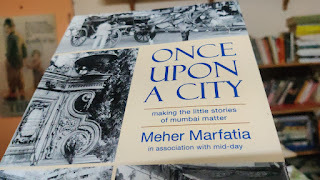
The book this week recommended by Dibyajyoti Sarma is Meher Marfatia’s Once Upon a City: Making the Little Stories of Mumbai Matter
Published by 49/50 Books; designed by Kermin S Colaco; printed at Jak Printers
And this is what the Jury Panel thinks about A Sky Full o...
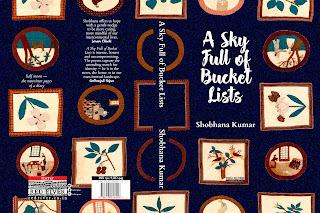 And this is what the Jury Panel thinks about A Sky Full of Bucket Lists by Shobhana Kumar — the recipient of the Touchstone Distinguished Books Honorable Mention for 2021
And this is what the Jury Panel thinks about A Sky Full of Bucket Lists by Shobhana Kumar — the recipient of the Touchstone Distinguished Books Honorable Mention for 2021 /
The variety of haibun styles and formats Kumar employs range from the common to the inventive. There are haibun structured as free verse, as dialogue, and as a letter. Haibun are presented sideways, in a different font, and interwoven with song lyrics. The form for each piece effectively enhances its meaning. What connects them all is a strong voice that creates an emotionally-impactful offering. These are life stories, sometimes tragic, spoken plainly using haibun elements that resonate and shift in delightful ways.
As we witness in A Sky Full of Bucket Lists “what happens in the head, in one’s home, on the streets, and in abandoned spaces”, we might discover threads from this rich tapestry that bring color to our own.
/
Read the full commentary here.
April 16, 2022
The book this week recommended by Dibyajyoti Sarma is The...
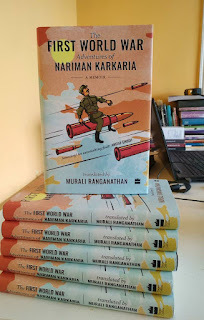 The book this week recommended by Dibyajyoti Sarma is The First World War: Adventures of Nariman Karkaria, translated from the Gujarati by Murali Ranganathan
The book this week recommended by Dibyajyoti Sarma is The First World War: Adventures of Nariman Karkaria, translated from the Gujarati by Murali Ranganathan Published by HarperCollins India, typeset in Goudy Old Story at Manipal Technologies; printed at Thomson Press



